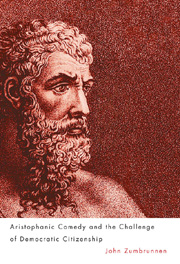Book contents
- Frontmatter
- Contents
- Acknowledgments
- Introduction
- 1 Peaceful Voyages: Peace and Lysistrata
- 2 Ordinary Citizens, High Culture, and the Salvation of the City: Clouds, Women at the Thesmophoria, and Frogs
- 3 Archē and the Anger of the Ordinary Citizen: Wasps and Birds
- 4 Elite Domination and the Clever Citizen: Acharnians and Knights
- 5 Fantasy, Irony, and Economic Justice: Assemblywomen and Wealth
- Conclusion: Democratic Possibilities
- Notes
- Bibliography
- Index
1 - Peaceful Voyages: Peace and Lysistrata
Published online by Cambridge University Press: 05 February 2013
- Frontmatter
- Contents
- Acknowledgments
- Introduction
- 1 Peaceful Voyages: Peace and Lysistrata
- 2 Ordinary Citizens, High Culture, and the Salvation of the City: Clouds, Women at the Thesmophoria, and Frogs
- 3 Archē and the Anger of the Ordinary Citizen: Wasps and Birds
- 4 Elite Domination and the Clever Citizen: Acharnians and Knights
- 5 Fantasy, Irony, and Economic Justice: Assemblywomen and Wealth
- Conclusion: Democratic Possibilities
- Notes
- Bibliography
- Index
Summary
March 3, 2003, was a banner day for the contemporary popularity of Aristophanes. On that day, according to an organizer, participants in The Lysistrata Project staged “over 1,000 readings” of Lysistrata “in 59 countries and all 50 states,” reaching “over 200,000 people.” Reflecting on the project in a later interview, organizer Kathryn Blume said that “in an ideal world the project would change the relevance of the voice of ordinary citizens and it would make war on Iraq impossible.” As a way of stopping the Iraq War, of course, the project failed. That failure no doubt reflects the difficulty of making the voices of ordinary citizens more relevant in contemporary politics, particularly in the political environment during the inexorable run-up to the invasion. But the Lysistrata Project seemed to aim as much at building a sense of efficacy as at effecting policy change. Here again is one of the organizers: “We told participants: ‘we are just here to help. You tell this story as you think best. You create this world as you want it to be.’” Whatever the prospect for stopping the war, the project on this understanding had the salutary goal of opening creative space for ordinary citizens to offer, if not their own story, then their own version of “this story.”
- Type
- Chapter
- Information
- Publisher: Boydell & BrewerPrint publication year: 2012



